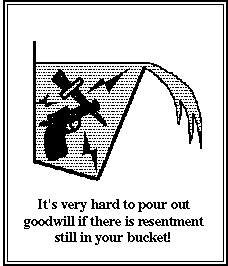Emotional Health and Jesus, "Can that be said in the same sentence?"
 You’ve just completed a project at work which took you hours of blood sweat and tears. Working with you is someone you respect, is better educated and has more experience and though you’ve never told anyone, for shame, you even hero worship a little. Also working along with you is someone much younger, better looking, great personality but, let’s say, a bit of a slacker, a water cooler connoisseur. Albeit you’ve done your best, the journey bittersweet, the project is complete. And now you sit in an uncomfortable chair with an uncomfortable lump in your throat before ‘the man’ whom before him lays your blood, sweat and tears. From a seemingly distant overstuffed life he explains to you where the most convenient exit is for you to take your things and find a better future employed by someone else.
You’ve just completed a project at work which took you hours of blood sweat and tears. Working with you is someone you respect, is better educated and has more experience and though you’ve never told anyone, for shame, you even hero worship a little. Also working along with you is someone much younger, better looking, great personality but, let’s say, a bit of a slacker, a water cooler connoisseur. Albeit you’ve done your best, the journey bittersweet, the project is complete. And now you sit in an uncomfortable chair with an uncomfortable lump in your throat before ‘the man’ whom before him lays your blood, sweat and tears. From a seemingly distant overstuffed life he explains to you where the most convenient exit is for you to take your things and find a better future employed by someone else.Based on the history given and the given fact you really want this job, what do you say?
Based on the history given how do you feel about 1. Your hero 2. The slacker 3. The man 4. Yourself?
Based on the history, what would you do?
In life we all go through trials, some more than others, some easier to name than others, some that come and go and have a clear beginning and end, some go on and on and we never seem to be able to point to a source. Name a struggle you have gone through and how you have reacted. How have you treated others? How have you treated yourself? Have you tried to deaden your feelings? Have you abdicated responsibility? Have you blamed others?
Your emotions are your antennae to your beliefs. When we read the above story we are given a history. What we don’t realize is that there are two histories. The actual events and our emotional history, one everyone can see, the other takes a ready eye. It might be true to say that our emotional history carries more weight in our decision making than the actual events and the actual events become apart of our emotional history which we carry into future events.
So what is the advantage of being able to process our emotions? What does that look like? How does that fit into your lifestyle? Personality?
What happens when someone is not able to process their emotional history? What does Jesus have to do with our emotional journey? (Ken McCullough for Thursday Night Study, Week 1)


0 Comments:
Post a Comment
<< Home